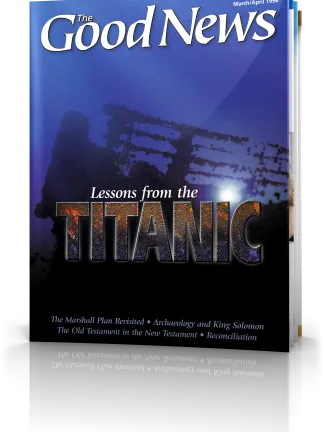Why Was Jesus Christ Resurrected?
What is the importance of the resurrection of Jesus Christ? What does it mean for our future?
Among the fundamental doctrines of the Bible listed in Hebrews 6:1-2 is the "resurrection of the dead." What is this resurrection? When will it occur? Who will be brought back to life? Can we be sure it will happen?
The resurrection is central to the life and aspirations of a follower of Jesus Christ and, in the long run, the whole human race. Unless there is a resurrection of the dead, there is no such thing as eternal life. The gift to mankind of the resurrection, a teaching to be found throughout the Bible, is the anchor of our salvation, a foundational doctrine of the true faith.
Scripture tells us that "it is appointed for men to die once" (Hebrews 9:27). But the Bible also shows that, just as all die, "even so in Christ all shall be made alive" (1 Corinthians 15:22). We are all to be resurrected, but all in due time, in a specific order (1 Corinthians 15: 23). Yet it all begins with Jesus Christ.
Christ's resurrection foretold
The first and so far only resurrection to eternal life has been that of our Savior, Jesus Christ. The first scriptural intimation of Jesus' death and resurrection was written some six millennia ago, 4,000 years before the birth of Christ. Here, in the Hebrew Scriptures, God pronounced judgment against Satan, the being who had subtly enticed Adam and Eve to disobey their Creator. God said to Satan, "I will put enmity between you and the woman, and between your seed and her Seed; He shall bruise your head, and you shall bruise His heel" (Genesis 3:15).
The "Seed" of the woman would bruise Satan's head, or permanently put an end to his influence over mankind, and Satan would "bruise His heel": instigate Christ's crucifixion.
But, ironically, Jesus Christ's crucifixion, coupled with the resurrection, makes our eternal life possible. The apostle Paul wrote of Jesus' victory over evil: "Thanks be to God, who gives us the victory [eternal life over physical death] through our Lord Jesus Christ" (1 Corinthians 15:57). Without Jesus' crucifixion and resurrection, humanity could never be saved, never gain eternal life (1 Corinthians 15:13).
Christ's atoning death makes possible the forgiveness of our sins and our reconciliation to God. This is the essential first step in God's plan to save humanity. Through Jesus Christ's restoration to eternal life almost 2,000 years ago, we, through our own resurrection, can also receive eternal life.
Symbol of Christ's resurrection
Jesus Christ's resurrection was symbolized through a ceremony God gave ancient Israel (Leviticus 23:10-14). During the Feast of Unleavened Bread, God instructed the priest to cut a sheaf of barley grain and wave it before Him to be accepted by Him. Hence it was called the wave-sheaf offering (verse 15). None of the harvest could be eaten until this ceremony had been conducted (Leviticus 23:14).
The wave-sheaf offering represented "Christ, the firstfruits" (1 Corinthians 15:23), as our coming Savior and the beginner of God's gathering of members of His family (2 Corinthians 6:18).
Jesus was received by His Father after His resurrection, although not immediately. When He first appeared to Mary Magdalene He said, "Do not cling to Me ['Touch me not,' King James Version], for I have not yet ascended to My Father; but go to My brethren and say to them, 'I am ascending to My Father and your Father, and to My God and your God'" (John 20:17).
Just as God commanded that the harvests in ancient Israel could not begin until He had accepted the wave-sheaf offering, so the harvesting of mankind would not begin until Jesus Christ was accepted by the Father as "the firstfruits" (1 Corinthians 15:23).
"In due time," at a time specifically appointed by God, "Christ died for the ungodly" (Romans 5:6) so that they could be given salvation in God's Kingdom. The harvest of humanity for eternal life could begin.
Christ's resurrection gives us hope
The Christian who understands the power inherent in Christ's resurrection has great hope. The Bible clearly reveals that certain Old Testament personalities knew of this hope. The patriarch Job knew of God's plan for man after death. He lived and died knowing he would eventually be resurrected.
"But man dies and is laid away; indeed he breathes his last and where is he? As water disappears from the sea, and a river becomes parched and dries up, so man lies down and does not rise. Till the heavens are no more, they will not awake nor be roused from their sleep. Oh, that You would hide me in the grave, that You would conceal me until Your wrath is past, that You would appoint me a set time, and remember me! If a man dies, shall he live again? All the days of my hard service I will wait, till my change comes" (Job 14:10-14, emphasis added throughout).
With biblical understanding, Job's words become clear. He knew the dead don't immediately rise to heaven. As Ecclesiastes 9:5 tells us, the dead "know nothing"; they lie unconscious in the grave, awaiting their resurrection.
Job knew he would be resurrected. But until then this patriarch would wait in his grave until his "change"-from physical to spirit, from mortal to immortal-occurred (1 Corinthians 15:50-54).
This was Job's hope. This is also our hope "of eternal life which God, who cannot lie, promised before time began" (Titus 1:2).
As Paul told the Roman officials who questioned him about his beliefs, "I have hope in God ... that there will be a resurrection of the dead, both of the just and the unjust" (Acts 24:15). This hope is "an anchor of the soul, both sure and steadfast" (Hebrews 6:19).
If Jesus had not been resurrected, we would have no hope of living forever. But we have the assurance that God, through Christ, will resurrect all who have ever died.
Faith in the resurrection
"Now faith is the substance of things hoped for, the evidence [realization or confidence] of things not seen" (Hebrews 11:1). Christians, by definition, believe in Christ's promises. One of His incredible promises is that we can be resurrected to eternal life (1 Corinthians 15:50-53). Although we can't know what it will be like to be a spirit being, the Scriptures assure us that this is our destiny (1 John 3:2).
Faith in Christ's promise to resurrect us is a powerful antidote for the fear of death and anxiety about the unknown: "Inasmuch then as the children have partaken of flesh and blood, He Himself likewise shared in the same, that through death He might destroy him who had the power of death, that is, the devil, and release those who through fear of death were all their lifetime subject to bondage" (Hebrews 2:14-15).
Fear of death is a form of captivity, of slavery. Although many people profess belief in some kind of life after death, few seem to want to go anytime soon. Men and women face the prospect of death with understandable apprehension and uncertainty. Without the sure knowledge given in the Scriptures, how could it be otherwise?
But Paul, well aware of God's revelation, understood that, just as death is sure, so is the resurrection of the dead. "For as in Adam all die, even so in Christ all shall be made alive" (1 Corinthians 15:22).
"And so it is written," according to Paul, "'The first man Adam became a living being.' The last Adam [Christ] became a life-giving spirit. However, the spiritual is not first, but the natural, and afterward the spiritual. The first man was of the earth, made of dust; the second Man is the Lord from heaven. As was the man of dust, so also are those who are made of dust; and as is the heavenly Man, so also are those who are heavenly. And as we have borne the image of the man of dust, we shall also bear the image of the heavenly Man" (1 Corinthians 15:45-49).
Paul confidently spoke of his imminent death as a temporary departure from the company of those of like faith: "... The time of my departure is at hand. I have fought the good fight, I have finished the race, I have kept the faith. Finally, there is laid up for me the crown of righteousness, which the Lord, the righteous Judge, will give to me on that Day, and not to me only but also to all who have loved His appearing" (2 Timothy 4:6-8).
Fleeting is death
Over and over the Bible proclaims the truth of the resurrection. As a matter of fact, death and the surety of the resurrection are compared to things we do every day: We go to sleep, and we wake up. The Bible repeatedly compares being laid to rest in the grave with lying down to sleep. "For now I will lie down in the dust," said Job (Job 7:21).
The prophet Daniel foretold the saints' death and resurrection: "And many of those who sleep in the dust of the earth shall awake, some to everlasting life, some to shame and everlasting contempt" (Daniel 12:2).
Jesus Himself compared death with sleep. Before the resurrection of one young girl, He comforted those who were grieving by saying, "Do not weep; she is not dead, but sleeping" (Luke 8:52). Similarly, He compared the death of Lazarus to sleep before Lazarus was brought to life again (John 11:11-13).
Paul sums up the hope of the resurrection for us: "If in this life only we have hope in Christ, we are of all men the most pitiable. But now Christ is risen from the dead, and has become the firstfruits of those who have fallen asleep" (1 Corinthians 15:19-20).
God's plan for human life and our goal is for us eventually to be changed into spirit, shining forever as the stars (Daniel 12:2-3).
We are destined to be a part of God's family, to be spirit, as He is spirit. "Beloved, now we are the children of God; and it has not yet been revealed what we shall be, but we know that when He is revealed, we shall be like Him, for we shall see Him as He is" (1 John 3:2).
Christ guarantees our resurrection
In God's beautiful plan, the resurrection to eternal life of all those who desire this wonderful gift can come only through a resurrected Jesus Christ. Otherwise the remainder of mankind would never experience everlasting life. Paul explains this in detail:
"Now if Christ is preached that He has been raised from the dead, how do some among you say that there is no resurrection of the dead? But if there is no resurrection of the dead, then Christ is not risen. And if Christ is not risen, then our preaching is empty and your faith is also empty. Yes, and we are found false witnesses of God, because we have testified of God that He raised up Christ, whom He did not raise up-if in fact the dead do not rise.
"For if the dead do not rise, then Christ is not risen. And if Christ is not risen, your faith is futile; you are still in your sins! Then also those who have fallen asleep [died] in Christ have perished. If in this life only we have hope in Christ, we are of all men the most pitiable.
"But now Christ is risen from the dead, and has become the firstfruits of those who have fallen asleep. For since by man [Adam] came death, by Man [Jesus] also came the resurrection of the dead. For as in Adam all die, even so in Christ all shall be made alive. But each one in his own order: Christ the firstfruits, afterward those who are Christ's at His coming" (1 Corinthians 15:12-23).
So our resurrection to eternal life is firmly based on a resurrected Jesus Christ. As He lives (even after His death), so we will live. "Thus God, determining to show more abundantly to the heirs of promise the immutability of His counsel, confirmed it by an oath, that by two immutable things, in which it is impossible for God to lie, we might have strong consolation, who have fled for refuge to lay hold of the hope [our resurrection] set before us. This hope we have as an anchor of the soul, both sure and steadfast, and which enters the Presence behind the veil, where the forerunner has entered for us, even Jesus, having become High Priest forever ..." (Hebrews 6:17-20).
Jesus Christ was resurrected so we and eventually all of mankind could someday be resurrected to eternal life. This is the Christian hope!





